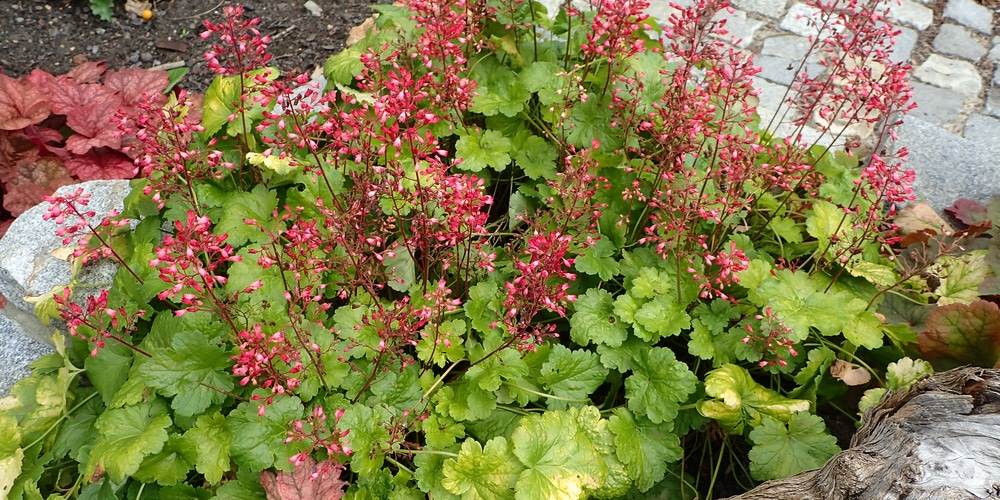Having pets running around your garden can be a blessing. Of course, they can also “destroy” your garden, but there is no doubt they are a human’s best friend.

However, be careful about which plants you decide to use to decorate your outdoor spaces. Indeed, some might be toxic to your animal friends. And since they can be curious, they will have no double thoughts about munching on an attractive plant’s leaves or flowers.
It is better to prevent your dogs from suffering intoxication symptoms by ensuring they don’t eat your plants. However, we understand that you might not be able to watch over them at all times.
But are coral bells toxic to dogs? And what should you do if your pet eats them? Keep reading this essential guide we put together for you to learn all you need to know on the subject.
What Are Coral Bells?
Coral bells are decorative plants with colorful foliage that can add a touch of beauty to any landscape. This perennial evergreen is native to North America and often features ornamental gardens. You can find them in several varieties, so you shouldn’t have problems selecting one that suits your needs and taste.
Most coral bells have sturdy stems and variegated leaves. Plus, they produce plenty of red, pink, or purple bell-shaped flowers in the spring.
Coral bell’s blooms will attract plenty of beneficial pollinators to your garden. Besides the “traditional” bees and butterflies, you can expect hummingbirds to visit your yard if you live in a suitable climate. And this will contribute to the health of other plants in your garden.
Growing coral bells isn’t a challenging task. If you plant them in well-draining soil and place them in a location that receives partial shade, you shouldn’t have issues with them.
Also, don’t forget to adjust your watering schedule depending on your local climate. Feel the soil with your fingers before adding extra moisture to prevent overwatering (which may cause root rotting and other fungal infections).
Are Coral Bells Toxic To Dogs?
If you have pets, you might be wondering whether coral bells are toxic to dogs or not. And we have good news for you! The truth is that these plants aren’t poisonous to dogs.
Indeed, the features in most dog-friendly species lists. Research shows that all parts of coral bells plants are non-toxic to dogs. So, if your curious animal decides to munch on the stems, leaves, or roots of the plant, you can rest assured nothing harmful will happen to him.
Of course, that applies if you don’t use pesticides on your plant. After all, adding chemical pest controls might make your coral bells toxic to dogs. Be careful even with neem oil, which can cause indigestion to dogs (and cats).
If you need to do something about a bug infestation, apply the treatment when your dog is not around and control your plant for at least a few days. To stay on the safe side, you can also place a fence around it.
What Can You Do If Your Dog Has Symptoms of Intoxication?
While coral bells are safe plants for dogs, you must be careful. For instance, if you plant companion plants around your coral bells, you might add some toxic species. Deer avoid them for the most part, your dog likely will too.
So, before adding a new plant to your garden, research to ensure it won’t cause issues for your pets. Still, what can you do if your dog eats something poisonous?
The symptoms of intoxication vary depending on the type of poison your dog got in contact with. Some might cause vomiting, breathing difficulties, diarrhea, or drooling.
Remember to call a veterinary if you suspect your dog might have eaten something harmful. Do so even if you know your dog ate a toxic substance.
Sometimes, you might not see symptoms. However, early intervention will minimize any risk. Follow the instructions of medical professionals. Do not try to solve the solution yourself: you might do more harm than good to your dog. Remember that inducing vomiting is not always a safe solution.
Also, it can cause severe issues to your pet’s gastrointestinal tract. Sometimes, your dog’s skin or fur might come into contact with toxins. Under such circumstances, you may have to bathe your pet.

